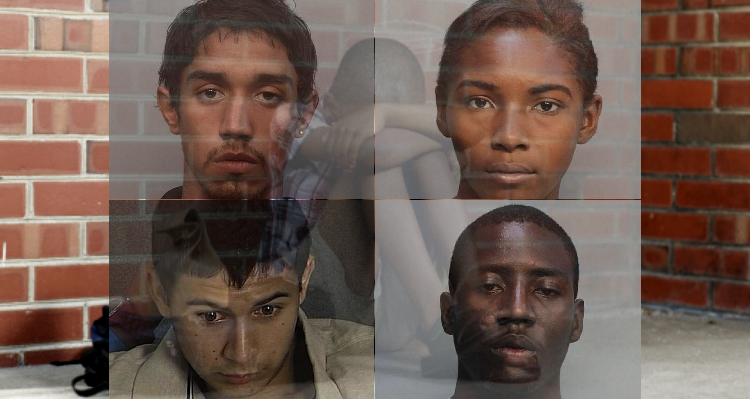
WARNING: DISTURBING CONTENT
This last week, 4 young adults in Florida brutally hacked one of their roommates with a machete, buried him alive in a shallow grave, and then had sex nearby as he slowly died.

The victim was 17 year old Jose Amaya Guardado.
The group considered murdering the teenager a fortnight before actually carrying out the act, and managed to dig a grave and hide the machete in the bush a few days before, police said.
According to the arrest report, the foursome lured Jose into the woods before “ambushing” him with the machete, causing “massive injuries”.
As he was dying, he was told to lie in the grave.
“The victim made one last attempt to fight off the attackers,” the detective wrote on the police form, “at which time, [Arbelo] struck the victim with the machete several more times until the victim’s face caved in.”
You can read the full story here.
We Desire Vengeance
If you are anything like me, your first response to this story was anger, fury, and a desire for vengeful justice to be leveled on those who would commit such a brutal crime.
Thoughts like “this is why we have the death penalty” popped into my mind.
Having grown up in a society of punitive justice – having been taught about a punitively vengeful God – stories like this elicit a wrath inside me to see those who have brutalized others receive a brutal end in return.
In the heat of the moment, it makes sense. If you hurt me, society hurts you in return. If you take something from me, society takes something from you.
What’s to stop the wicked from hurting us if we don’t promise retribution in return?
The Truth About “The Wicked”
Let’s look a bit closer at this story.
All 5 individuals were students at Homestead Job Corps, a live-in school and vocational training program run by the US Department of Labor.
This type of program is often the last available option for kids who grew up in the foster care system, have been in and out of juvenile detention, or have been wards of the state in some way.
I used to work with kids and young adults like this.
I worked for a government-subsidized program that housed and schooled kids who were one step removed from either juvenile detention or a mental hospital.
Here’s what I can tell you about the 4 attackers pictured above:
- They were probably traumatized very early in their childhood.
- I can almost guarantee they were sexually abused at some point in their lives.
- They have probably been passed through a number of programs, with very little parental or legal guardian consistency in their lives.
- I can almost guarantee they are all on some form of medication(s).
- Their presence in the school is 100% a “last chance” sort of situation.
In other words, these kids have nothing. They are as broken as broken can be.
Behind each one of these remorseless adults is a child who spent years crying out for help with no one able to meet the desperate need for love we all bring with us into this world.
That child died years ago.
So often we see actions like this, and think, “People are horrible.” But the fact is, people who are subjected to horror often behave horribly in return.
It’s a cycle of death.
Brokenness begets more brokenness, which begets more brokenness in a never-ending cycle.
Redemptive Justice
The truth is, punitive justice has never really worked. Sure, it can mitigate, hedge, or restrain crime from getting to unmanageable levels, but I believe that misses the point.
Jesus didn’t come so that we could “manage” society into something reasonably comfortable. He came to give us abundant life.
[Tweet “Just as revenge never leads to peace, retribution never leads to true justice.”]
In business, we have something called “sunk costs”. When a cost is incurred that can’t be recovered, it’s a “sunk cost”. Even if it was a terrible decision, it’s done and should no longer be included in evaluating future decisions.
For example, if I were to spend $15,000 on creating a new product, only to then discover the product is not viable in the market, my investment in the product is now a sunk cost and will not be included in my future decision making. If I let the fact that I just made this big investment influence my planning, I am exercising poor decision-making.
The underlying principle here is that at any given moment, I should be making decisions based on what is BEST as of this moment.
Not what would have been best yesterday. What is the best possible outcome moving forward?
This is the same underlying principle of redemptive justice. The question isn’t, how can we make someone suffer appropriately for their crimes? The question is, how can we see this situation redeemed into abundant life?
“And Jesus answered and said to them, ‘It is not those who are well who need a physician, but those who are sick. I have not come to call the righteous, but sinners to repentance.” Luke 5:31-32
“Repentance” is healing. Redemptive justice is healing.
It looks at the NOW and asks, “What is the best-case scenario available right now? How can we reach abundant life, from this point forward?”
Abundant Life in Florida
When I look in the eyes of these four, I see a lifetime of brokenness and abandonment. It doesn’t excuse what they’ve done. That’s not what I’m saying.
It is a brutal, inexcusable tragedy that Jose Amaya Guardado is not alive today. There is no changing this, and we should allow ourselves to feel the pain of this tragedy and grieve with Jose’s family.
But tomorrow, what if, instead of asking, “How can we make the attackers pay?” we asked, “How can we partner with Holy Spirit to bring abundant life to everyone involved?”
How can achieve a best case scenario from this point forward?
Is true justice seeing these 4 broken young adults suffer the rest of their lives in prison?
I don’t think so.
I think true justice is seeing these 4 restored into wholeness. I think true justice is taking a tragedy the enemy intended to end 5 lives and seeing 4 of them step into the abundant life Jesus made available.
Perhaps, for those who believe in a God who’s version of vengeance is eternal torment, such a redemptive ending seems out of place. 4 deaths to pay for the 1 makes sense.
But I think, if we really understood what grace truly meant – if we saw life and death, mercy and justice, from God’s eyes – we’d understand His heart to redeem – to completely restore – in every single moment.
This is the Father who Jesus came to reveal – the Father we were commanded to share with the world.
This is the Father who gives us testimonies like these:
This is abundant life.












Very thought-provoking. Your point is not lost on me. I would add only a thought or two on the subject of punitive justice. Giving a life sentence to someone may or may not be the right way of administering rehabilitation, since the goal or objective of rehabilitation is to restore a person back to normal society, where they are no longer a danger to themselves or others. For example, we hope that a convicted thief finds genuine remorse for their crime and is able to correct their behavior for the good of all. Therefore, one desired result of punitive justice is the restoration of the offender.
But, there is another goal of justice that must be considered. There is a price that must be paid by all who choose to stray beyond the boundaries of civility. This price exists to persuade the other members of that civility to obey the rules. When someone crosses over and commits a crime, consequence results. It is the understood and expected price one pays for disobedience.
If we chose not to demand that price, even on those who crossed a line as a result of personal brokenness or childhood trauma, we demonstrate to all others within the civility that the cost of breaking the law is variegated, or uneven, if you will. As such, the consequence part of punitive justice exists not as a means of rehabilitating the criminal, but as a reminder to the rest of society that there will always be a cost for crossing the line.
Having said all that, I am, as a Christian, far more interested in the huge void that exists to rehabilitate criminals in the American justice system. Far more disturbing than a life sentence for four violent teens is the complete lack of interest anyone has in seeing real rehabilitation for these “remorseless adults.” The love of Christ knows no bounds, and while they might deserve death, as do we all, the question we must ask ourselves as believers is how do we bring the love of Christ to people such as these? Such answers are not easily given, but certainly we must be asking the question, nonetheless. Thanks for the thoughtful article.
Thanks Scott. You make a good point. There is the matter of consequences that serve to prevent crime. That’s real.
I think the success of prisons in countries like Sweden and Norway demonstrates that you don’t need harsh punishment to prevent crime. Repeat offenders account for a large percentage of crime in the US, and that also goes to demonstrate that punishment doesn’t serve to prevent crime.
It’s definitely a tricky subject, but I think we can all agree that we are utterly failing at it in the US.
Comments are closed.